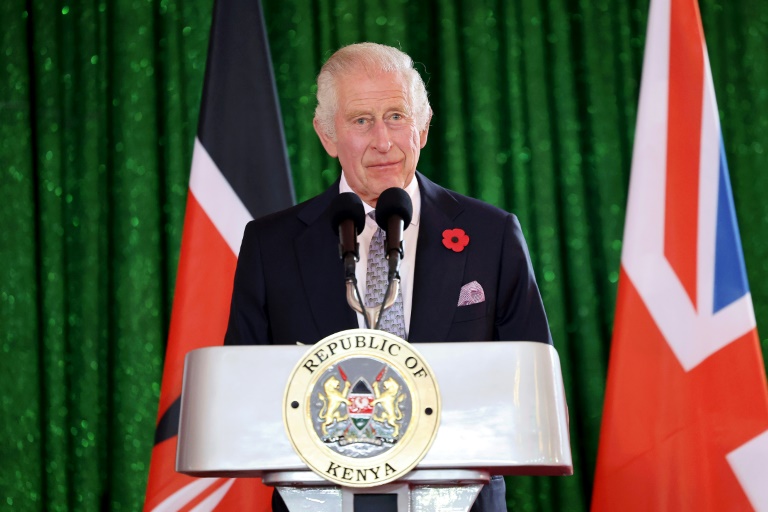The family of Dedan Kimathi, who was hanged by the British administration, and relatives of other well-known Kenyan freedom fighters didn’t immediately comment.
In the past, they have called for an apology and compensation from Britain, along with any information on the whereabouts of Kimathi’s body.
The British High Commission said only that the meeting was an “opportunity for the king to hear firsthand about the violence committed against Kenyans during their struggle for independence.” Attendees included the chair of the Mau Mau War Veterans Association.
The issue remains painful for many Kenyans, and police dispersed a couple dozen people protesting at the foot of a monument to Kimathi in Kenya’s capital, Nairobi. “All the land under British should be given back to the Kenyan people,” said Juliet Wanjira with the Mathare Social Justice Center, calling also for the British military training mission in Kenya to leave.
Charles, who with Queen Camilla arrived on Monday (Oct. 31) in what is his first state visit to a Commonwealth country as monarch, on Tuesday cited the “abhorrent and unjustifiable acts of violence” committed against Kenyans as they sought independence. However, he didn’t explicitly apologize for Britain’s actions in its former colony as many Kenyans wanted.
Charles on Wednesday (Nov. 01) also visited a war cemetery, laying a wreath in honor of those who fought alongside the British in the two world wars.
He handed replacement medals to four war veterans who had lost theirs. Among the four was Cpl. Samwel Nthigai Mburia, who claims to be 117. The other three are privates John Kavai, Kefa Chagira and Ezekiel Nyanjom Anyange.
The cemetery has 59 graves and is next to Kariokor market, previously the site of Nairobi’s Carrier Corps Depot, the administrative center through which soldiers heading to the front passed through. Charles also met with the Commonwealth War Graves Commission members and communities living near the cemetery.
On the roads leading to the war cemetery, at a walking distance from the central business district, authorities deployed heavy security including army, an anti-terror police unit, elite units and regular police.
Kenya is celebrating the 60th anniversary of its independence this year. It has had a close but at times challenging relationship with Britain after the prolonged struggle against colonial rule, sometimes known as the Mau Mau Rebellion, in which thousands of Kenyans were killed.
Colonial authorities executed and detained many without trial as they tried to put down the insurrection, and thousands of Kenyans said they were beaten and sexually assaulted by agents of the administration.
Meanwhile, Germany’s president apologised on Wednesday for killings under colonial rule in Tanzania as he met descendants of Chief Songea Mbano executed for leading a revolt.
In Songea, southwestern Tanzania, President Frank-Walter Steinmeier vowed to seek answers to questions regarding the German East Africa era. The German East Africa was a colony part of the German possessions. It covered todays’ Tanzania, Rwanda and Burundi existed from 1885 until the end of World War I.
“My dear family (of Songea, ed.), I mourn with you for Chief Songea, and for all the others who were executed. I wish to pay my respects to the victims of the German colonial rule. And as German President I would like to ask for forgiveness for what Germans did to your ancestors here,” Steinmeier said.
He added that Mbano was “a brave leader” in the rebellion.
“I beg your forgiveness and I would like to assure you that we Germans will search with you for answers to the open, unanswered, outstanding questions that give you no peace.”
Steinmeier laid a rose at Chief Songea Mbano’s grave and a wreath at a mass grave of 66 other fighters in the Maji Maji uprising, German news agency dpa reported.
Up to 300,000 people are believed to have died during the Maji Maji rebellion between 1905 and 1907.
Skulls brought back to Germany could include that of chief Mbano. Steinmeir has vowed to try to find it, according to remarks released by his office. “Unfortunately, I just can’t promise you that we will be successful,” because identifying human remains is difficult even with scientific expertise, he added.
In 2017, Tanzania’s then-government said it was considering legal action to seek compensation from Germany for the people who allegedly were starved, tortured and killed by German forces.
Germany in 2021 announced an agreement with Namibia, another country where it was once the colonial ruler, to recognize colonial-era massacres of tens of thousands of people there as genocide and provide funding to help the communities affected. But the accord stopped short of formal reparations.
That agreement, which some groups representing the Herero and Nama people aren’t happy with, has yet to be formally signed off on.



